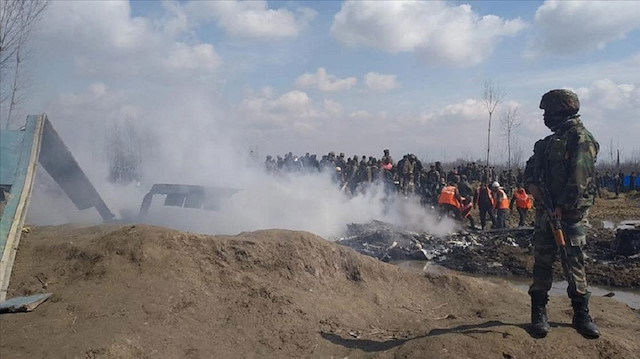
A Pakistani-origin U.S. academic described rising tensions between India and Pakistan as an "international" and not a "bilateral" issue, saying the UN should mediate.
Speaking to reporters in a phone interview on Wednesday, Abdullah al-Ahsan, a professor at the Department of Political Science and International Relations at Istanbul Sehir University, said: “India has miscalculated Pakistan and has made a big mistake by attacking Pakistan.”
Pakistan on Wednesday claimed it had shot down two Indian military aircraft that entered its territory and arrested a pilot. India said it had shot down a Pakistani jet and lost one of its aircraft in the process along the Line of Control -- a de facto border that divides the disputed Kashmir Valley.
A third Indian military chopper crashed in Indian-administered Kashmir on Wednesday killing all six people on board and a civilian on the ground, according to Indian broadcaster NDTV. Pakistan said it had nothing to do with this air crash.
Tensions between the two nuclear neighbors have escalated after a suicide bombing in Jammu and Kashmir that killed more than 40 Indian paramilitary troops on Feb. 14. The Jaish-e-Mohammad (JEM) militant group claimed responsibility for the attack, which India said had headquarters in Pakistan, a charge Islamabad denied.
On Tuesday, Indian jets entered Pakistan's airspace to target a JEM camp saying it had killed several militants, a claim Pakistani officials denied.
Pakistan has banned the JEM since 2002.
“India should have accepted Pakistan's offer to investigate the attack in Pulwama [in India’s northern state of Jammu and Kashmir.] by providing evidence of Pakistan's involvement in the incident,” said al-Ahsan, referring to Pakistani Prime Minister Imran Khan's call to open investigation into the suicide bombing.
He urged the UN or the International Court of Justice to mediate the issue.
“I expect Pakistan to restrain from any immediate retaliatory action. As Prime Minister Imran Khan has again offered, I expect India to accept Pakistan's offer for dialogue,” he added.
Increased tension and a possible war between the two nuclear powers will also affect neighboring countries, the professor said.
“If there is a war between India and Pakistan, it will not only affect India and Pakistan. Afghanistan, next door, will also suffer. Other countries will also be affected,” he said.
“They are a nuclear power. You cannot ignore the effect of nuclear energy, nuclear bomb,” al-Ahsan said.
Jammu and Kashmir, a Muslim-majority Himalayan region, is held by India and Pakistan in parts and claimed by both in full. A small sliver of Kashmir is also held by China.
Since they were partitioned in 1947, the two countries have fought three wars -- in 1948, 1965 and 1971 -- two of them over Kashmir.














